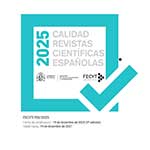Knowledge management in the process of digital transformation in COVID-19 times into a serviec office of a higher education institution
Abstract
Currently the main asset in organizations is knowledge as it allows them to be more innovative.
Knowledge comprises thoughts stored in human memory through learning. It becomes definitions, references and technologies. In organizations, knowledge generation is continuous, in order to maximize it and to apply it. Hence the relevance of managing knowledge, understood as all the actions made by employees in an organization linked to procedures, technologies & systems of the organization that add value to products or services (Ikujiro Nonaka, 1994). In this paper we describe the way knowledge management helped to carry out the digital transformation process of a public desk in a higher education institution. Moreover, the spread of the SARS-CoV-2 virus (COVID-19) intensified the pathway. Here, the methodology follows a qualitative approach and is based upon a case study. We mean to show how to manage knowledge and how employees are involved in the digital transformation process of the services provided by the human resources desk at the organization analysed. With this work we suggest a pattern for organizations with similar traits, in processes of digital transformation.
Article download
License
In order to support the global exchange of knowledge, the journal Derecom. Derecho de la Comunicación is allowing unrestricted access to its content as from its publication in this electronic edition, and as such it is an open-access journal. The originals published in this journal are the property of the Complutense University of Madrid and any reproduction thereof in full or in part must cite the source. All content is distributed under a Creative Commons Attribution 4.0 use and distribution licence (CC BY 4.0). This circumstance must be expressly stated in these terms where necessary. You can view the summary and the complete legal text of the licence.







